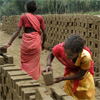COMMUNITY VOICE: Work to Live

COMMUNITY VOICE:
Work to Live
A Difficult Life for Women in Kashmir and Jammu
The region of Kashmir and Jammu in northern India is home to many impoverished women struggling to support themselves and their families. With few profitable industries to choose from, and little educational background, they turn to brick-making, farming, and weaving. For some, teaching and nursing are also viable alternatives, though these jobs are difficult to find and often require travel. In this photo series, photographer Elena Fava Emerson shares a glimpse of the women of the region hard at work.
In the regions of Kashmir and Jammu, in northern India, the economy remains largely unaltered by modern systems of production. Instead, it relies on traditional industries like agriculture and livestock-raising. The economic status of the Muslim and Hindi women living there depends on their husbands' income, the class they were born into, their religion, and their often rudimentary education. Although some women receive institutional compensation, or benefits, many of them remain vulnerable to exploitation. In the villages especially, they struggle with extreme poverty. When other resources fail them, women must strike out on their own to sustain themselves and their children.
Financial security is precarious; I met one father whose youngest daughter was recently hospitalized. He spent his entire savings to pay for the hospital bills--money that was meant to pay off his wedding debt. Wedding celebrations are a very important tradition in India, but often the family cannot afford the pay for the expenses, and husbands or families are left deep in debt.
One industry that women turn to is brick-making. In order to pay off their debts, women like those pictured here might work for years, toiling day after day through mountains of red clay until they can afford to improve their life. The children of the destitute help their mothers, following them to a muddy field every day rather than attending school. It is a hopeless existence, with little certainty other than seemingly endless labor.
Women farmers and craftswomen, who embroider beautiful shawls, also struggle to make a living. They often work with their families in the villages, building a self-sustaining community to protect and defend themselves from external political disputes. Spinning pashmina shawls and other yarns is a traditional industry of Kashmiri women. This vocation is more easily pursued when women stay at home, taking care of children.
Kashmiri widows are a particularly vulnerable group. Even in a time of relative peace, they endure poverty and desolation as a result of the years of violent dispute over the territory. After the death of a husband, according to Islamic law, widows cannot claim their husband's property. Facing few options, many go back to their parents' house. Without a husband to provide for them, nor any rights to his property, they must coordinate taking care of children as well as earning enough income to support their families.
Despite their impoverished condition, these women have been, and remain, active participants in their community. The most educated and privileged teach at the community elementary schools. Women's education and professional skills have seen a steady increase over recent years, and it is quite common for women to seek jobs outside the community as nurses and teachers. Sadly, women seek jobs and educational opportunities not simply to achieve personal goals, but as a matter of survival.


